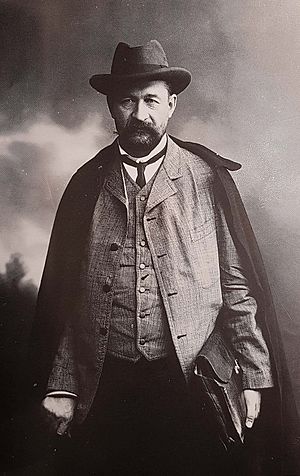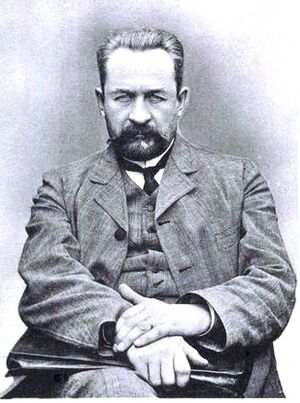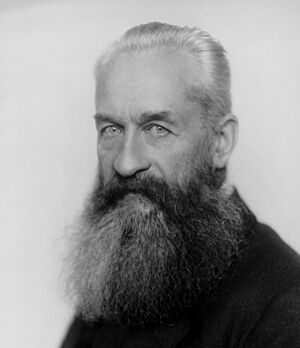Georgy Lvov facts for kids
Quick facts for kids
Georgy Lvov
Георгий Львов |
|
|---|---|

Georgy Lvov as Prime Minister in March 1917
|
|
| Minister-Chairman of the Russian Provisional Government | |
| In office 15 March 1917 – 20 July 1917 |
|
| Preceded by | Nikolai Golitsyn (As Prime Minister of Russia) Nicholas II (As Emperor of Russia) |
| Succeeded by | Alexander Kerensky |
| Minister of Interior | |
| In office 15 March 1917 – 20 July 1917 |
|
| Prime Minister | Himself |
| Preceded by | Alexander Protopopov |
| Succeeded by | Nikolai Avksentiev |
| 8th Prime Minister of Russia | |
| In office 15 March 1917 – 20 July 1917 |
|
| Monarch | Vacant |
| Preceded by | Nikolai Golitsyn |
| Succeeded by | Alexander Kerensky |
| Personal details | |
| Born |
Georgy Yevgenyevich Lvov
2 November 1861 Dresden, Saxony, German Confederation |
| Died | 7 March 1925 (aged 63) Paris, France |
| Nationality | Russian |
| Political party | Constitutional Democratic (1905 – 1911) Progressive (since 1911) |
| Alma mater | Moscow State University |
| Profession | Politician |
| Religion | Russian Orthodoxy |
Prince Georgy Yevgenyevich Lvov (2 November 1861 – 7 March 1925) was an important Russian leader. He was the first prime minister of Russia's temporary government from March to July 1917. During this time, he was like the country's main leader.
Lvov was part of the Lvov princely family, a very old noble family in Russia. He became well-known for helping people during the Russo-Japanese War. In 1905, he joined a political group called the Constitutional Democratic Party.
Contents
Early Life and Education
Georgy Lvov was born on November 2, 1861, in Dresden, which was then part of the German Confederation. His family, the Lvovs, were one of Russia's oldest noble families. They were related to the ancient Rurik dynasty princes from Yaroslavl.
Georgy's father believed in new ideas and spent most of his money on his children's schooling. Georgy and his five brothers went to top schools in Moscow. They lived at their family home in Popovka, near Tula, not far from where the famous writer Leo Tolstoy lived. The Lvovs and Tolstoy were close friends.
Unlike many rich noble families, the Lvovs lived a simple life. Their home was not grand, and their farm was small. After serfdom (a system where peasants were tied to the land) ended in 1861, the family faced money problems. They had to sell some of their properties to pay off large debts.
To save their ancestral home, Popovka, the family decided to work hard to make the farm profitable. Georgy's father was too sick to work, so his older brothers and sister managed the farm. Georgy studied law at the University of Moscow. The family even let go of their servants and lived like peasants. Georgy later said this experience made them more "democratic." By the late 1880s, they had paid off all their debts and saved their home.
Work Before the Revolution
Helping During the Russo-Japanese War
When the war between Japan and Russia started in 1904, local councils called zemstvos began to help. Lvov led a medical team of 360 doctors and nurses to help the Red Cross on the front lines. This was the first time these local councils were allowed to work together across the country.
Lvov asked Tsar Nicholas to let the team go. The Tsar was so impressed by Lvov's dedication that he hugged him and wished him well. This relief mission was highly praised by military leaders. It also helped the zemstvos become more involved in Russian society.
Political Life
A year later, Lvov was elected to the First Duma, which was like a parliament. He was even considered for a government job. In 1914, he became the head of the All-Russian Zemstvo Union. This group helped supply the military and care for wounded soldiers during World War I.
February Revolution and Leadership
In March 1917, during the February Revolution, Tsar Nicholas II gave up his throne. Georgy Lvov was then chosen to lead the new temporary government formed by the Duma.
Head of the Provisional Government
As prime minister, Lvov quickly introduced many new reforms to make Russia more free.
- Everyone over a certain age could vote.
- People gained freedom of the press and speech.
- The death penalty was stopped.
- All legal limits based on religion, social class, or race were removed.
In late March, a group of women who wanted the right to vote (called suffragettes) planned to ask Lvov for women's voting rights in local elections. They were surprised to learn that Lvov had already given women the right to vote. He said, "Why shouldn't women vote? ... Surely, with universal suffrage there can be no reason to exclude women." Lvov's changes helped create a new sense of democracy in Russia.
However, Lvov found it hard to get enough support for his government. He resigned in July 1917. Alexander Kerensky, his Minister of War, took over as prime minister.
Life After Power
After the October Revolution, Lvov was arrested and taken to Yekaterinburg. He was later released and quickly left the city. He traveled to Omsk, which was controlled by groups against the Bolsheviks.
The temporary government in Siberia asked Lvov to go to the United States. He was to meet with President Woodrow Wilson and other leaders. His goal was to explain the aims of the anti-Bolshevik forces and ask for help from Russia's former allies in World War I.
Lvov went to the United States in October 1918. But he arrived too late. World War I ended in November, and the focus of world politics moved to the peace conference in Paris.
Since he couldn't get much help in the United States, Lvov moved to France. He lived in Paris and helped Russian people who had left their country. He used funds from the Zemgor organization (which he had led) to help these emigrants. Later, he stopped being involved in politics. He lived a simple life in Paris, working with his hands and writing his memories. Georgy Lvov passed away in Paris, France, on March 7, 1925, at 63 years old.
Memorials
There is a memorial for Prince Lvov in Aleksin, and a small exhibit about him in the town museum. In Popovka, there is another memorial near his local church and a plaque on the school he started. He is buried in the Sainte-Geneviève-des-Bois Russian Cemetery in France.
A relative, Prince Andre Nikita Lwoff, is buried in the old cemetery in Menton, France.
|
See also
 In Spanish: Gueorgui Lvov para niños
In Spanish: Gueorgui Lvov para niños
 | Percy Lavon Julian |
 | Katherine Johnson |
 | George Washington Carver |
 | Annie Easley |



